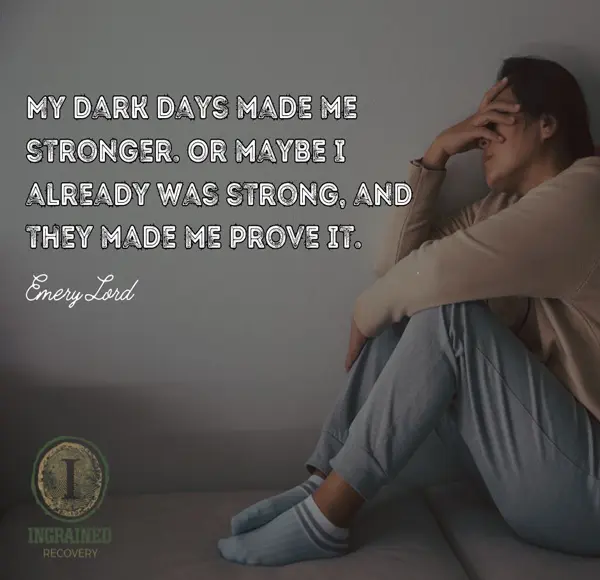Find Proven PHP Day Programs in GA With the Support of Ingrained
If you need to find Partial Hospitalization Program Georgia services, there are no shortage of options. Many providers claim to offer a partial hospitalization program effective for addiction and mental health treatment. But it’s important to know that not all PHP treatment programs are the same.
Some focus almost singularly on getting people “off drugs,” without treating traumatic memories or mental illnesses that caused the problem to begin with. That approach is ineffective and can cause more harm than good.
Ingrained Recovery does not currently offer on-site PHP programs due to our remote and exclusive setting, but refers all detox and inpatient clients to preferred, accredited providers throughout the state and country. Our caring team can provide referrals to effective facilities for partial hospitalization programs and intensive outpatient programs, from Atlanta to Macon and across the Peach State.
If you need to understand more about how partial hospitalization programs work versus an intensive outpatient treatment program, please keep reading. You’ll discover all the information necessary to choose the best outpatient hospitalization program in Atlanta.
Armed with good information, you will be able to address the next steps in finding help with any mental health disorders.
Key Differences: Partial Hospitalization Program (PHP) or Intensive Outpatient Program (IOP)
While both the PHP and IOP programs fall under the category of outpatient therapy, there are some subtly shaded differences between the two partial day program offerings. It’s important, too, that we note that both are evidence-based treatments and play an important role in the continuum of care.
Get Effective Treatment Programs at Ingrained Recovery

Partial Hospitalization Program (PHP) - A Step-Down Approach From Inpatient Care
A PHP program is a step down from a residential program. The structure of the PHP setting gives clients a set routine that allows them to focus on their therapies. Outpatients usually come to treatment at least 5 days per week. They attend the treatment center several hours a day, for up to six hours of care.
Partial Hospitalization Program therapists focus on stabilizing the symptoms of their mental health disorders and tracking progress. The treatment plan includes one-on-one counseling to explore the causes of their trauma or mental health disorder. It provides effective treatment for a variety of mental health disorders, including:
- Anxiety or panic disorders
- Depression
- Bipolar Disorder (or other mood disorders)
- Post-traumatic Stress Disorder
- Substance Use Disorder
The Partial Hospitalization Program is often the best treatment plan for those living with fairly significant mental health disorders but who cannot commit to in-patient care.
Partial Hospitalization Programs: Evidence-Based Therapy for Improved Mental Health
Clients also receive highly individualized, evidence-based therapies from experienced counselors. These often include the following treatment and recovery activities:
- Cognitive behavioral therapy (CBT)
- Dialectical Behavioral Therapy (DBT)
- Motivational Interviewing (MI)
- Medication management
They usually participate in other therapeutic activities, such as art therapy or yoga.
Clients may attend individual, group, and family therapy sessions, according to each person’s individual mental illness.
Who Is a Good Candidate for an Atlanta Partial Hospitalization Program?
Any Atlanta partial hospitalization program (or anywhere else in Georgia) works best for people who need a good deal of care and monitoring for their mental illness or substance abuse. However, these clients still fall short of the need for overnight hospitalization.
In addition, a partial hospitalization program offers an excellent step-down approach. It is ideal for someone who no longer needs the more restrictive nature of a residential program but still needs the watchful eyes of skilled staffers.
How Long Does a Partial Hospitalization Program PHP Last?
A partial hospitalization program at a recovery center in Georgia can last anywhere from a few weeks to several months, depending on the person’s individual needs. Another factor that impacts the treatment program length is the coverage for services approved by the insurance company or Georgia Medicaid.

Intensive Outpatient Care: Support and Therapies With Less Time Commitment
Outpatients in an Intensive Outpatient Program (IOP) still have a set daily schedule and similar treatment goals, like PHP. The key difference is the time commitment in the IOP. Clients in this outpatient model attend therapies up to five days a week; they attend therapies from 3 to 5 hours per day.
IOP therapists develop a personalized treatment plan for each client to master life skills that assist recovery. Counselors help create an environment that helps the IOP clients build the necessary life skills to overcome or manage the symptoms of their mental health disorders.
Get Proven Detox and Rehab Options at Ingrained
IOP: Evidence-Based Mental Health Treatment

Like the PHP, IOP clients can expect to attend individual, family, and group therapy at the facility. They also receive similar holistic therapies. Some typical alternate therapies may include yoga or music therapy.
In these settings, they can expect to overcome (or get help with managing) a variety of mental health diagnoses and restore their physical and mental wellness.
The IOP is often a very good setting to receive a variety of treatments and services, including the following:
- Depression or bipolar disorder
- Mood disorders
- Panic or anxiety disorders
- Medication management
- Drug or alcohol addiction
Much of what will determine the success of IOP is patients’ willingness to stay clean and sober when they go home at night. The services are not long-lasting if the home environment does not support the strides made during daytime therapy sessions.
Who’s a Great Candidate to Receive IOP Recovery Services?
The Intensive Outpatient Program is reserved for adults who need support and structure while they learn to cope with their feelings and mental illnesses but have a stable, positive home to sleep at night. This environment is also an excellent way to level down from the PHP while still receiving physical and mental wellness support.
How Long Can One Expect IOP Treatment to Last?
Intensive Outpatient Programs often last from three months to six months or more. It largely depends on the specific mental health treatment the client needs and how well the symptoms resolve. As with the PHP, it often comes down to how much help the insurance or Georgia Medicaid will provide.
What Mental Health Disorders Are NOT a Good Fit for an Outpatient Program?
Outpatient care is not a suitable treatment program for someone actively engaging in self-harm or who has recently threatened to end their life. It is critical that you call to het them immediate help. Those in these circumstances are experiencing a mental health crisis that requires close monitoring and appropriate life-saving medications.
Due to the intensity of this situation, a person in this condition would be safest in the care of the expert treatment team at our residential program in Eastman, Georgia, after the client is made stable in a hospital and the immediate crisis has ended.
After an initial assessment to determine they are no longer at such an elevated risk, this client would be closely monitored in our residential facility. Probable treatment would include finding the proper medications and starting the most intensive therapies. Their immediate safety and wellness is of prime importance.

After PHP or IOP: Find Recovery Community in Atlanta, Georgia
Regardless of choosing a partial hospitalization program or intensive outpatient care, maintaining better mental health requires an ongoing commitment. One way to continue making great strides and strengthening your commitment to ongoing wellness is by joining a recovery community.
Especially if you’ve completed an outpatient hospitalization program in Atlanta, you will find many opportunities to attend Alcoholics Anonymous (AA), Narcotics Anonymous (NA), or SMART Recovery. However, cities outside of Atlanta also have these group sessions, usually meeting once per week.
Another way to attend, especially if you live in a rural community, is to make a connection with these groups through their online offerings. The remote platforms allow you to access the group sessions from anywhere.
When mastering any life skills, consistency and accountability are keys to success. Learning to manage the symptoms of depression, trauma, substance use disorder, or other mental health challenges is no different! These group sessions hold you accountable for your own wellness. We urge you to find a recovery community and attend once a week after you leave your outpatient services.
Up To 100% of Rehab Costs Covered By Insurance
Connect With Ingrained for Referral to a Partial Hospitalization Program
While Ingrained Recovery focuses on mental wellness through our evidence-based residential treatment program, we can make a referral to a PHP partner anywhere in Georgia, including Atlanta and beyond. Call our admissions team today, we are glad to help you start your journey to wellness.
All calls are confidential, so please reach out for proven support options now!
